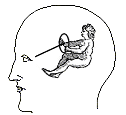 The homunculus returns? I finally saw Inside Out (possible spoilers – I seem to be talking about films a lot recently). Interestingly, it foregrounds a couple of problematic ways of thinking about the mind.
The homunculus returns? I finally saw Inside Out (possible spoilers – I seem to be talking about films a lot recently). Interestingly, it foregrounds a couple of problematic ways of thinking about the mind.
One, obviously, is the notorious homuncular fallacy. This is the tendency to explain mental faculties, say consciousness, by attributing them to a small entity within the mind – a “little man” that just has all the capacities of the whole human being. It’s almost always condemned because it appears to do no more than defer the real explanation. If it’s really a little man in your head that does consciousness, where does his consciousness come from? An even smaller man, in his head?
Inside Out of course does the homuncular thing very explicitly. The mind of the young girl Riley, the main character, where most of the action is set, is controlled by five primal emotions who are all fully featured cartoon people – Joy, Sadness, Anger, Fear, and Disgust, little people who walk around inside Riley’s head doing the kind of thing people do (Is it actually inside her head? In the Beano’s Numskulls cartoon, touted as a forerunner of Inside Out, much of the humour came from the definite physicality of the way they worked; here the five emotions view the world through a screen rather than eyeholes and use a console rather than levers. They could in fact be anywhere or in some undefined conceptual space.) It’s an odd set (aren’t Joy and Sadness the extremes of a spectrum?) Unexpectedly negative too: this is technically a Disney film, and it rates anger, fear, and disgust as more important and powerful than love? If it were full-on Disney the leading emotions would surely be Happy-go-lucky Feelin’s, and Wishing on a Star.
There are some things to be said in favour of homunculi. Most people would agree that we contain a smaller entity that does all the thinking; the brain, or maybe even narrower than that (proponents of the Extended Mind would very much not agree, of course). Daniel Dennett has also spoken out for homunculi, suggesting that they’re fine so long as the homunculi in each layer get simpler; in the end we get to ones that need no explanation. That’s alright, except that I don’t think the beings in this Dennettian analysis are really homunculi – they’re more like black boxes. The true homunculus has all the capacities of a full human being rather than a simpler subset.
We see the problem that arises from that in Inside Out. The emotions are too rounded; they all seem to have a full set of feelings themselves; they show all show fear and Joy gets sad. How can that work?
The other thing that seems not quite right to me is unfortunately the climactic revelation that Sadness has a legitimate role. It is, apparently, to signal for help. In my view that can’t really be the whole answer and the film unintentionally shows us the absurdity of the idea; it asks us to believe that being joyless, angry and withdrawn, behaving badly and running away are not enough to evoke concern and sympathetic attention from parents; you don’t get your attention, and your hug till they see the tears.
No doubt sadness does often evoke support, but I can’t think that’s its main function. Funnily enough, Sadness herself briefly articulates a somewhat better idea early in the film. It’s muttered so quickly I didn’t quite get it, but it was something about providing an interval for adjustment and emotional recalibration. That sounds a bit more promising; I suspect it was what a real psychologist told Pixar at some stage; something they felt they should mention for completeness but that didn’t help the story.
Films and TV do shape our mental models; The Matrix laid down tramlines for many metaphysical discussions and Star Trek’s transporters are often invoked in serious discussions of personal identity. Worse, fears about AI have surely been helped along by Hollywood’s relentless and unimaginative use of the treacherous robot that turns on its creators. I hope Inside Out is not going to reintroduce homunculi to general thinking about the mind.
